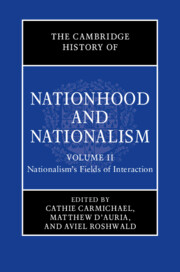Book contents
- The Cambridge History of Nationhood and Nationalism
- The Cambridge History of Nationhood and Nationalism
- The Cambridge History of Nationhood and Nationalism
- Copyright page
- Contents
- Figures
- Tables
- Contributors
- Part I Imperial and Postcolonial Settings
- Part II Transnational and Religious Missions and Identities
- Part III Intersections: National(ist) Synergies and Tensions with Other Social, Economic, Political, and Cultural Categories, Identities, and Practices
- 21 Self-Determination and National Sovereignty
- 22 Citizenship and Nationhood: From Antiquity to Gaia Citizenship
- 23 Religion and Nationhood
- 24 Nationalism and Capitalism
- 25 Economic Nationalism in an Imperial Age, 1846–1946
- 26 National Identity and the Idea of Race in the Dinaric Region
- 27 Nationalism, Ethnic Cleansing, and Genocide: A View from Below
- 28 Warfare, Nation Formation, and the Legitimacy of States: An Ethnosymbolic Perspective
- 29 Nationalism, Terrorism, and the State: Historical Perspectives
- 30 Negotiating National Identity through Tourism in Colonial South Asia and Beyond
- 31 Gendered Nations and Institutions
- 32 Historiographies and Commemorative Practices
- 33 Nation and Literature
- 34 Foodways and Nationhood
- 35 The Dynamics of National Music: Opera and Classical Music in the Nineteenth and Early Twentieth Century
- 36 Media and Nationalism: Europe and the USA, 1500–2000
- Conclusion to Part III
- Index
- References
26 - National Identity and the Idea of Race in the Dinaric Region
from Part III - Intersections: National(ist) Synergies and Tensions with Other Social, Economic, Political, and Cultural Categories, Identities, and Practices
Published online by Cambridge University Press: 08 November 2023
- The Cambridge History of Nationhood and Nationalism
- The Cambridge History of Nationhood and Nationalism
- The Cambridge History of Nationhood and Nationalism
- Copyright page
- Contents
- Figures
- Tables
- Contributors
- Part I Imperial and Postcolonial Settings
- Part II Transnational and Religious Missions and Identities
- Part III Intersections: National(ist) Synergies and Tensions with Other Social, Economic, Political, and Cultural Categories, Identities, and Practices
- 21 Self-Determination and National Sovereignty
- 22 Citizenship and Nationhood: From Antiquity to Gaia Citizenship
- 23 Religion and Nationhood
- 24 Nationalism and Capitalism
- 25 Economic Nationalism in an Imperial Age, 1846–1946
- 26 National Identity and the Idea of Race in the Dinaric Region
- 27 Nationalism, Ethnic Cleansing, and Genocide: A View from Below
- 28 Warfare, Nation Formation, and the Legitimacy of States: An Ethnosymbolic Perspective
- 29 Nationalism, Terrorism, and the State: Historical Perspectives
- 30 Negotiating National Identity through Tourism in Colonial South Asia and Beyond
- 31 Gendered Nations and Institutions
- 32 Historiographies and Commemorative Practices
- 33 Nation and Literature
- 34 Foodways and Nationhood
- 35 The Dynamics of National Music: Opera and Classical Music in the Nineteenth and Early Twentieth Century
- 36 Media and Nationalism: Europe and the USA, 1500–2000
- Conclusion to Part III
- Index
- References
Summary
Notions of shared collective identity or ethnos are ancient belief systems imbibed at an early age, codified in literature, and transmitted through learned or sacred texts and “common knowledge.” There may be elements of logic in such beliefs that become harder to uncover with the passage of centuries. For example, notions of collective identity often perpetuate the belief that the stranger brings danger and only “kin-culture communities” (to use Azar Gat’s term) can be trusted.1 Perhaps logical caution developed into custom and was perpetuated by political practice (i.e. the formation of states). The modern idea of race, which views human populations as fundamentally different from each other in measurable ways, can be linked most emphatically to colonial exploitation in the early modern and modern eras. In its assumption about nature, it is thus fundamentally different from earlier ideas about ethnos or collective identity.
Keywords
- Type
- Chapter
- Information
- The Cambridge History of Nationhood and Nationalism , pp. 559 - 577Publisher: Cambridge University PressPrint publication year: 2023

